Aaron Millar discovered an unexpected bonus when he took his family on a camping trip in British Columbia
Something happens when kids go camping. It took us an hour of driving down a bumpy 4×4 track in the deep back country of British Columbia to find it, but when the perfect campsite arrived, a sandy beach on the remote eastern shore of Jones Lake, 96 miles east of Vancouver, it was like watching a pack of wild monkeys attack a banana split. They played in the water. They built forts. They made up imaginary games. They even helped do the bloomin’ washing up.
Then, as the sun slowly set, and the sharp ridge of Knight Peak, 2,235m above, began to glow in soft pink light, something equally amazing happened: they stopped. Both kids cuddled in, one on each lap, marshmallow goo dripping down their fingers, a fire burning on our own deserted beach, not a soul around, but the eagles soaring above and the sky reflected in perfect symmetry on the water below. They somehow got it. The stillness of the moment, the preciousness of it. I don’t think I’ve ever felt more connected as a family than that one moment, camping beside Jones Lake.
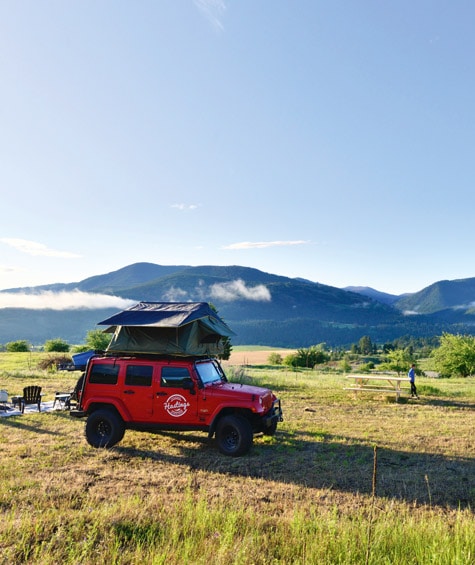
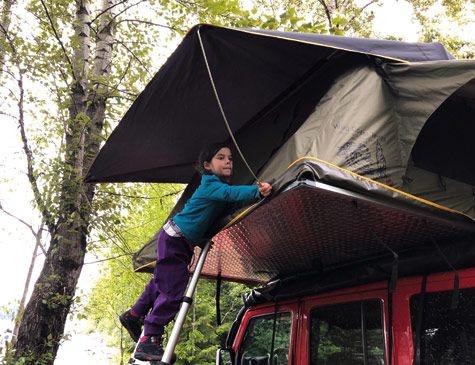
But this wasn’t ordinary camping and that had something to do with it too. Picture a shiny red jeep with
pimped out tyres, a kitchen in the boot and a pop-up tent that folds out on the roof 2.5m above the ground. We were overlanding, which is defined as remote self-reliant adventure travel on four wheels, but think of it more like extreme camper vanning – all the adventure of proper camping, with all the convenience of an RV. We’d come to British Columbia, because although overlanding has been big in Africa for years, it’s only just launched here in western Canada. That’s surprising: if ever there was a landscape screaming out for rugged off-road exploration, British Columbia’s vast network of old logging roads is it.
The plan was to head east, from Vancouver, through the pasturelands of the Okanagan Valley, Canada’s fruit and wine-producing region, before cutting north into the Kootenays, one of the least well-known, but most spectacular parts of the Canadian Rockies – 1,000 miles in seven days. But, just as we were about to leave, Maxwell Webster, founder of Hastings Overland, the company we’d booked with and an overlanding nut himself, looked me dead in the eye. ‘The itinerary is just the start,’ he said. ‘This is your adventure – get lost.’ That’s my kind of road trip.
For the first couple of nights we decided to take it easy and follow Max’s lead, camping near the turquoise waters of Kentucky Alleyne Provincial Park the first night, 200 miles east of Vancouver, and then cutting south 175 miles to Grand Forks and a new solar-powered glamping site at Pioneer Organic Farm. We arrived in the shivering dark and awoke to a perfect sunrise: mountains peaking above a low mist, 180-degree views sweeping across winelands, orchards of apple and peach far below.
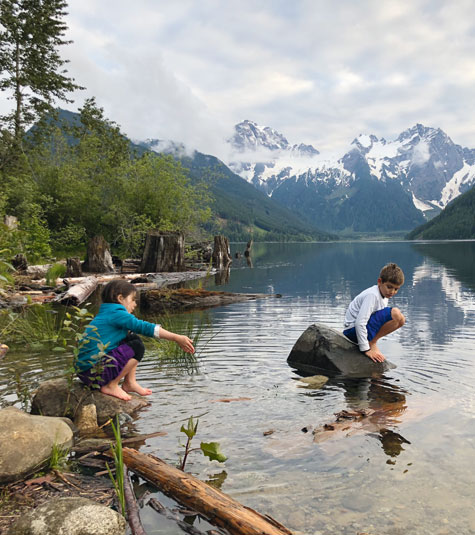
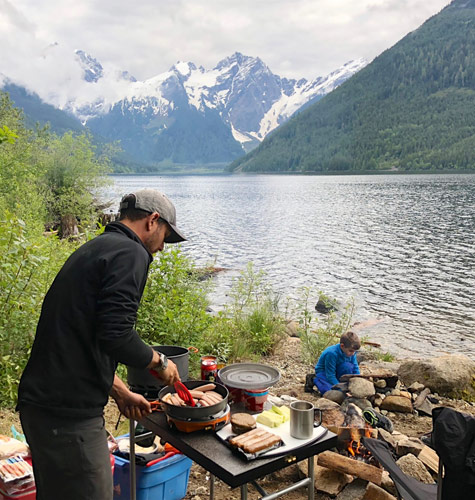
Then it was time to hit the big stuff and we had a treat in store. The Kootenay Rockies are like a mountain fairy tale: jagged granite peaks soaring 3,000m above shimmering blue lakes as smooth as stretched velvet. After a breakfast of pancakes and maple syrup by the fire, we drove 60 miles east to the old gold rush town of Rossland and then turned north for another 40 miles to the Slocan River for some of the best white water rafting in the region. It started quiet. Drifting down spring tides, the pyramidal peak of Siwash Mountain in front, water sparkling like silver in the sun. But Cameron, nine, was bored: ‘I want to get splashed!’, he kept screaming. Then, suddenly, his wish came true: wave after wave, we crashed through Class III rapids, surges of icy flow washing over our heads, a white water rodeo scarier and more intense than any roller coaster. Cameron, in the front of the boat, took the worst of it: slapped in the face with icy waves over and over again. ‘OK,’ he said finally, shivering and deadpan as can be. ‘I’m splashed enough.’
Luckily, we had a plan to warm him up. The whitewater guides had told us about a campsite beside some natural hot springs, off an old logging road near the town of Nakusp an hour up the road. Almost 13 bumpy kilometres and one black bear later – we rounded a corner, in the middle of nowhere, and found him foraging on berries by the side of the road) we parked, made camp and hiked down to the Halfway River, where steaming hot springs from deep in the earth flow into a series of natural eddies in the river, cornered off with stones like the world’s most idyllic hot tub. After three days of camping there is perhaps no more delicious feeling – and the first time I’ve ever not heard the kids complain about having a bath.
Camp life fell into an easy pattern. Over the next few days, we followed old forest service roads for dozens of miles into the wilderness, thick forests of pine, Douglas fir and cedar rising all around, deer ghosting through the foliage beside the trail. At Little Slocan Lake, we camped beside an old 20th-century homestead, log cabins broken and slowly fading back into the earth. At a campsite near Kelowna we sat out late and watched the stars deepen in the pure darkness of a wilderness sky. The pop-up tent proved quick and easy to set up, too – though it does require some agility – and the kids loved sleeping up there. ‘It’s like the best treehouse ever!’ Elise, six, said – even at the big-kid age of 40, I had to agree.
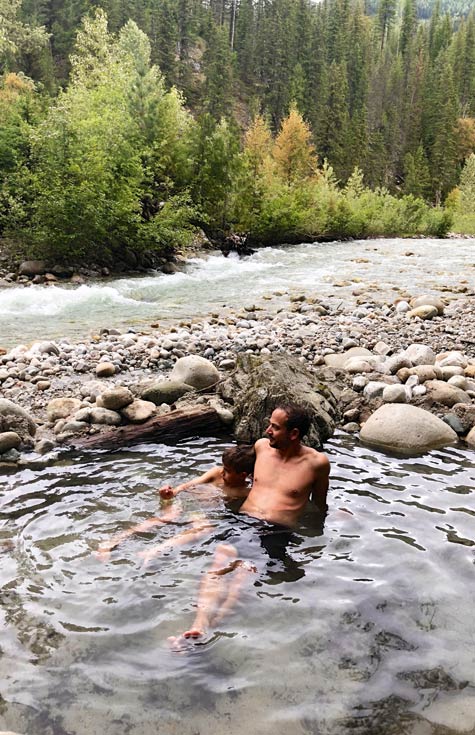
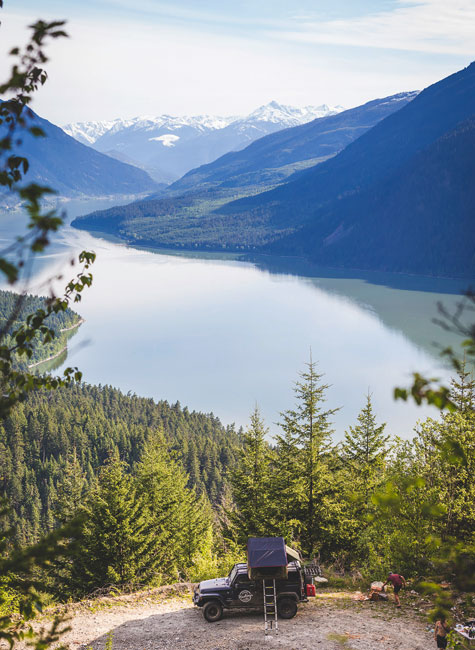
Then, on our last day, something special: we’d heard about a waterfall, deep in the backcountry, near the town of New Denver, an hour and 45 minutes’ drive north of Rossland, so on a whim decided to check it out. The last bit was a seven-mile bumpy road until we arrived at the trailhead and hiked down a winding forest path towards the roar of the cascade. Wilson Creek Falls is one of the largest waterfalls in the country after Niagara. But that supreme cascade is the Las Vegas of natural wonders, fast food and cheap souvenir stalls on every corner. Here, we had it all to ourselves: a raging torrent pouring 63m through a steep canyon, swirling in a vortex of white noise and energy that covered us in an icy mist from more than 30m away. We screamed and danced, and splashed river water on our faces. Alone, in this wild place, it felt like we had discovered it for the first time ourselves.
That made me think. Something happens when kids go camping, but it happens to us too. We slow down. We find each other. That’s what being in the outdoors is all about; it’s what being in a family’s about, too. Because in the end, no matter how many mountains you climb or journeys you take, raising kids is the greatest adventure of all. What better way to celebrate it, than by getting lost together.
Aaron Millar travelled as a guest of Destination British Columbia. His latest book, 50 Greatest National Parks of the World, which features British Columbia, is out now.
Hastings Overland provides touring experiences in fully equipped jeeps in British Columbia, Canada. Overland jeep rental, sharing a rooftop tent, costs from £185 per night at Easter and from £220 per night from the May half-term through September.
Pioneer Organic Farm has sites for overlanding jeeps and tents from £28 per night including breakfast and use of all facilities. Cabins and Glamping Tents cost from £57 per night.
For more info visit hellobc.co.uk